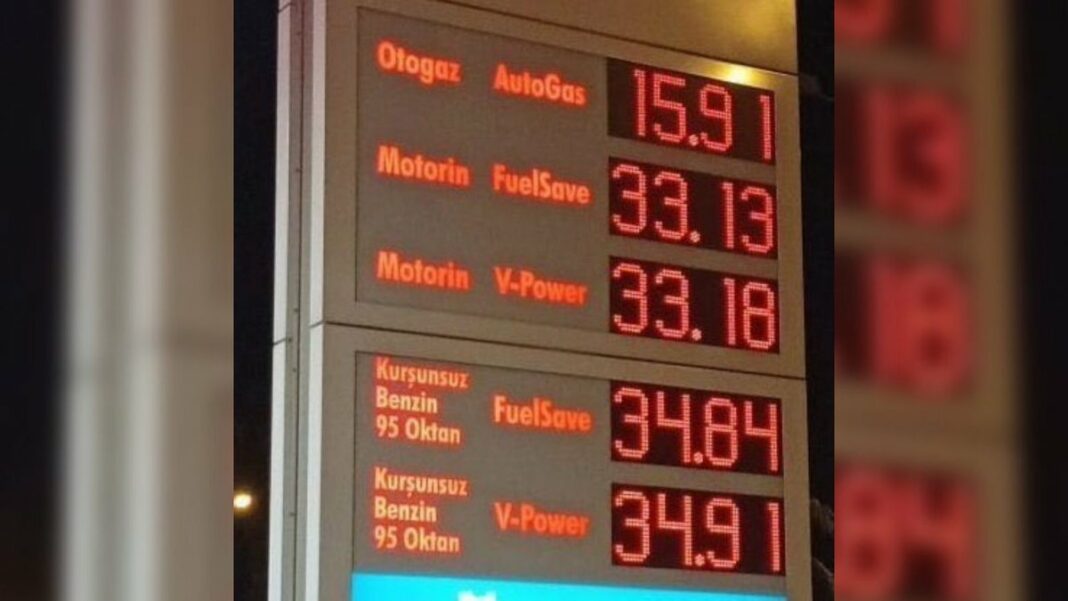Turkish President Recep Tayyip Erdoğan has introduced a significant hike in the Special Consumption Tax (SCT) on fuel products, leading to an increase of TL 5 per liter for diesel and 95-octane gasoline and TL 3 for liquefied petroleum gas (LPG), against a challenging economic backdrop, local media reported over the weekend.
As a result of Erdoğan’s decision, which was published in the Official Gazette on Sunday, the SCT per liter of gasoline increased from TL 2.52 to TL 7.52, while the tax per liter of diesel increased from TL 2.05 to TL 7.05. In the case of LPG, the tax was raised from TL 2.97 to TL 5.77.
Additionally, the SCT was increased for products such as benzene, toluene, xylene, solvent naphtha and lubricating oils.
According to the Turkish Ekonomim news website, the price of gasoline per liter in Turkey’s largest city and commercial hub of İstanbul increased from TL 28 ($1.07) to TL 34 ($1.30), while the price of diesel per liter increased from TL 26 ($0.99) to TL 32 ($1.22) following the decision.
Tax expert Ozan Bingöl also announced in a tweet that the SCT on natural gas used in residential buildings has also been tripled.
Değerli arkadaşlar daha fazla moralinizi bozmak istemem ama konutlarda kullanılan doğalgazda da ÖTV üç katına çıkarılmıştır.
Sm3’te 0,0230 TL olan ÖTV bugünkü karar ile 0,0747 TL’ye yükseltilmiştir!
Ayrıca geçtiğimiz günlerde doğalgazdaki KDV oranı da %20 olmuştu.— Ozan Bingöl (@ozanbingoll) July 16, 2023
With the new decision, the amount representing SCT in a gas bill of TL 100 has increased from TL 2 to approximately TL 6, according to Turkish media reports.
The Treasury and Finance Ministry, in a written statement regarding the tax increase, stated that the reasons for it are to reduce the impact of additional costs caused by February earthquakes on the budget and indirectly help control the current account deficit. The ministry also emphasized that despite the depreciation of the Turkish lira, there have been almost no tax increases since 2016.
Minister of Environment, Urbanization and Climate Change Mehmet Özhaseki said in late June that the magnitude 7.8 and 7.5 earthquakes that hit Turkey on Feb. 6, killing more than 50,000 people and leaving millions homeless in 11 provinces in the country’s south and southeast, caused damage in the amount of $100 billion.
Criticizing the latest hike, nationalist opposition İYİ (Good) Party leader Meral Akşener said: “Well, is there any change in the extravagant lifestyle of the ruling party? None! They make the people suffer while they indulge themselves in palaces and with entourages.”
Geçtiğimiz hafta yapılan zamlarla, yeni maaşlar daha yatmadan erimişti.
Dün gece itibariyle, eski maaşları da yemeye başladılar.
Peki iktidarın şatafatlı hayatında bir değişim var mı?
Yok!
Cefayı bal eylemek millete, sefasını sürmekse saray ve şürekâsına…
— Meral Akşener (@meral_aksener) July 16, 2023
Bilge Yılmaz, deputy chairman of İYİ, also referred to the tax increases as “tyranny” and called for an end to them.
“The [ruling Justice and Development Party] AKP should put an end to making the public, especially low-income individuals, bear the cost of its own mistakes,” Yılmaz said.
AK Parti kendi yaptığı hataların bedelini halka ve özellikle de dar gelirlilere ödetmeye son vermelidir.
Seçimlerden önce "Dar gelirli vatandaşlarımız fedakârlık yapacak bir durumda değil. Kemerler tabii ki sıkılacak ama bu sefer fedakârlığı başka kesimler yapmak zorunda"…
— Bilge Yılmaz (@ProfBilgeYilmaz) July 16, 2023
Not only opposition politicians but also New Welfare Party (YRP) Chairman Fatih Erbakan and leader of the Grand Unity Party (BBP) Mustafa Destici, who are members of President Recep Tayyip Erdoğan’s Public Alliance, reacted to the increase in tax on fuel products.
Erbakan said on Sunday that attempting to cover the budget deficit through large increases in indirect taxes results in significant price hikes in goods and services, triggers high inflation and severely weakens the purchasing power of citizens.
“We should put an end to these practices that burden the citizens with the cost of budget deficits as soon as possible,” he added.
Destici also said it’s “not acceptable or fair” to impose an increase of over 200 percent in the SCT on fuel products.
“Using price increases or austerity measures to fix the economy and close budget deficits are things that ordinary economic managers can do as well. … It is our citizens’ right to expect less burdensome solutions when figures who are respected or deemed influential in the world of economics are in power,” Destici said, referring to Finance Minister Mehmet Şimşek.
Erdoğan named Şimşek to his cabinet in early June to tackle Turkey’s cost-of-living crisis and other strains, in a clear sign that his newly elected government would return to more orthodox economic policies after years of unorthodox moves that resulted in runaway inflation and the lira sinking to record lows.



